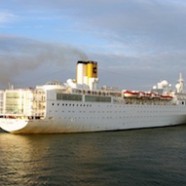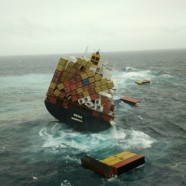New Zealand: Forewarning of the Big One
The grounding of the Rena in New Zealand
The grounding of the Rena on October 5th and the subsequent inability of the ship-owner and New Zealand maritime authority’s to free the vessel, to stop the fuel from leaking and to avoid the loss of containers foreshadow big future disasters in the field of container shipping.
In 1980 the largest container ships carried up to 2,000 containers, in 1991 up to 4,400, in 2003 the figure increased to 8,800 and in 2007 up to 14,500 containers. Starting from 2013, some container ships from the Danish company Maersk will be able to transport up to 18,000 containers. The “normal” crew size of 19 could further be reduced to 13. The container ships will measure 400 meters in length, 59 meters in width and the containers will be staked up to 73 meters in height. These new container ships will also carry 15,000 to 20,000 tons of bunker fuel however, the exact capacity is confidential. Insurers as well as Search and Rescue services, port stakeholders, maritime experts and some environmental NGOs are all concerned about this endless race to gigantic container ships.
Oil slick Queen demolished in Bangladesh ?
According to informations coming from Chittagong, three container ships managed by German companies have just been put on sale on the demolition market. These three vessels are the joint property of KGAL, based in Germany, the largest European maritime leasing* company, and subsidiary of Allianz and Dresdner Bank, and of V Ships Germany, subsidiary of V Ships Monaco, the largest manager of commerce vessels in the world.
The Ankara, the Maersk Brisbane, and the Maersk Barcelona (Maersk is solely the charterer) were built in Germany in 1975-1976 and are motorized by vapor turbines whose installation requires large quantities of asbestos. These three sisterships have a lightweight of 15,000 t each.
Already, V Ships and KGAL have made it known that they will assign the container ships destined for demolition to the highest bidder, that is to say to Bangladeshi demolition shipyards, at around $700 per ton while the average price in India is around $550 per ton.
Considering social, sanitary, and disastrous environmental conditions in Bangladesh, Robin des Bois asks these European companies to either proceed with the preliminary removal of asbestos, to choose the best Asian demolition shipyards within the framework of a specific partnership, or even to demolish and recycle these vessels in Europe. A letter was sent to them in this respect.
The three container ships are frequently in European waters and one of them, the Maersk Barcelona, appeared on the Atlantic front in September 2005, near the island of Sein, off Brittany, by a record “61 km (38 miles) oil slick” that was sanctioned by an $800,000 fine. The inspectors from the vessel security center had revealed a lack of care for the oily waters treatment installation.
Oil slick Queen demolished in Bangladesh ?
According to informations coming from Chittagong, three container ships managed by German companies have just been put on sale on the demolition market. These three vessels are the joint property of KGAL, based in Germany, the largest European maritime leasing* company, and subsidiary of Allianz and Dresdner Bank, and of V Ships Germany, subsidiary of V Ships Monaco, the largest manager of commerce vessels in the world.
The Ankara, the Maersk Brisbane, and the Maersk Barcelona (Maersk is solely the charterer) were built in Germany in 1975-1976 and are motorized by vapor turbines whose installation requires large quantities of asbestos. These three sisterships have a lightweight of 15,000 t each.
Already, V Ships and KGAL have made it known that they will assign the container ships destined for demolition to the highest bidder, that is to say to Bangladeshi demolition shipyards, at around $700 per ton while the average price in India is around $550 per ton.
Considering social, sanitary, and disastrous environmental conditions in Bangladesh, Robin des Bois asks these European companies to either proceed with the preliminary removal of asbestos, to choose the best Asian demolition shipyards within the framework of a specific partnership, or even to demolish and recycle these vessels in Europe. A letter was sent to them in this respect.
The three container ships are frequently in European waters and one of them, the Maersk Barcelona, appeared on the Atlantic front in September 2005, near the island of Sein, off Brittany, by a record “61 km (38 miles) oil slick” that was sanctioned by an $800,000 fine. The inspectors from the vessel security center had revealed a lack of care for the oily waters treatment installation.











